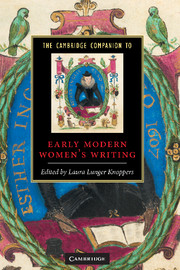Book contents
17 - Private drama
from Part III - Genres and modes
Published online by Cambridge University Press: 28 July 2010
Summary
Early modern England was less than hospitable to women playwrights. Although there is no known formal prohibition against women writing for the stage, not a single play from the theatre of Shakespeare's time was written by a woman. Scholars have not yet fully accounted for this strikingly overt bias, but there is enough evidence in anti-theatrical and moral writings of the time to suggest that the secular, public nature of commercial theatre was fundamentally incompatible with the conception of female virtue as domestic: the ideals of godliness, chastity and good housewifery were invariably imagined as achievable only within the space of the home. Ideological constraints of this kind are, of course, always open to violation, and indeed we have enough records of women transgressing domestic boundaries with impunity to suggest that, in terms of women's lived reality, female virtue and the public sphere were not categorically opposed. And yet women did not write public stage plays until the early 1660s. What they did write is variously identified as domestic, household or closet drama, all three terms signalling a perceived distinction between plays written for a paying, public spectatorship and plays written for a private audience of family and friends. This dichotomy of public (male) stage and private (female) household drama is a useful framework for understanding the nature of women's playwrighting in the early modern period until the 1660s, but it also has conceptual and rhetorical limitations.
- Type
- Chapter
- Information
- The Cambridge Companion to Early Modern Women's Writing , pp. 247 - 259Publisher: Cambridge University PressPrint publication year: 2009
- 6
- Cited by



